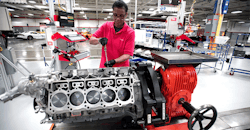Industry Leaders Discuss the 'Good News, Bad News' of Manufacturing’s Future
After releasing its most recent survey on public attitudes toward manufacturing a week prior, the Brookings Institution hosted the eighth annual John Hazen White Forum on Public Policy to discuss the survey’s findings.
The forum, which was split into two, one-hour panels, was moderated by Darrell West, the vice president of Governance Studies at Brookings and director of the survey.
In the first hour, the panel included discussion from U.S. Rep. David Cicilline of Rhode Island; Molly Kinder, senior advisor at Work, Workers & Technology; and John H. White Jr., owner and chief executive officer of Taco Comfort Solutions.
West kicked off the discussion by describing the survey’s findings as a “good news, bad news" situation. "The good news is that 58% of Americans see manufacturing as vital to the U.S. economy… but the bad news is that only 17% are very confident in the future of manufacturing,” he said.
Despite the survey’s somewhat grim findings on the perception of the industry, the panel expressed confidence in the future.
“I’m very optimistic about the future of manufacturing in this country,” Cicilline said. “I was very pleased to see in that report the public's perception of manufacturing is very high.”
He added: “One of the reasons I think you see lower numbers about the future of manufacturing is because I think there’s a lot of anxiety about automation, about technology and about workforce capabilities. I think one of the biggest things we can do is to stay relentlessly focused on workforce training.”
Last week’s national survey reported that only 21% of Americans said they would definitely encourage a young person to enter the manufacturing sector, with 26% saying they possibly would, 8% saying they definitely wouldn’t, 12% saying they possibly wouldn’t and 33% unsure.
When asked if he thought there was a future for young people in manufacturing, White expressed optimism.
“I think there is a future for manufacturing,” White said. “It’s an exciting one and I think it will hold true to what we know, that studies will show the manufacturing industry is the greatest creator of wealth.”
In the panel’s second hour, West moderated a panel that included Buckley Brinkman, chief executive officer of the Wisconsin Center for Manufacturing and Productivity; David Brousell, co-founder and vice president of the Manufacturing Leadership Council; and Cheryl Merchant, president of Taco Comfort Solutions.
Brinkman started off the panel’s hour by saying the future of manufacturing faces a “stark picture” due to the current skills gap.
“One of the big things we see affecting the manufacturers is that the skills gap has now turned into a body gap,” he said. “We’re seeing that the projections for the workforce in the next 20 years are to remain flat. In fact, the only population age group that’s growing in the workforce is 55 and over.”
On solutions to the skills gap turned body gap issue, Brinkman said, “If you haven’t gone back and looked at why your customers are writing you a check, how you’ve created value in the last five years, chances are you’re missing something.”
He added that the biggest mistake companies can make when addressing the skills gap is to jump into automation and technology.
“If you jump into automation or some other kind of technology, you’re going to do one of two things: You’ll implement the wrong technology in the wrong place in the wrong way, or you will automate something that shouldn’t have been done in the first place,” he said.
On the topic of workforce, Merchant emphasized the importance not only of retraining, but also communicating with workers.
“People are everything,” she said. “People are everything about your companies, your opportunities, your growth, your focus and where it should be. It’s not just about the training, but it’s about understanding them.”
Although the industry is facing an increasingly large skills gap, the panel ended the forum with renewed confidence in manufacturing’s future.
“We’re the people who make things,” Brousell said. “If we can make a jet engine, if we can make a medicine that cures a disease, if we can make a microchip circuit that has more information on it than the entire Library of Congress, then we can figure out how to retrain. It’s a man-made problem. If it’s a man-made problem, then man can solve it.”
Both panels are archived on the Brookings Institution site and available to watch here.
About the Author
Abigail Miller
Reporter
Abigail Miller is a senior journalism major at Kent State University, reporting and editing at IndustryWeek as part of its 2019 summer editorial internship program.
